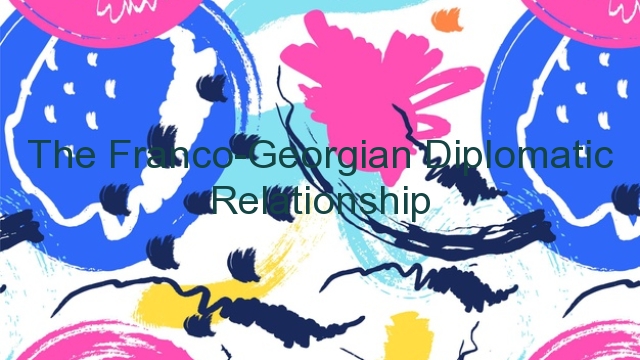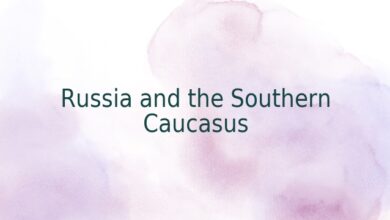
The Franco-Georgian Diplomatic Relationship
From the Letters of the King of Imereti Solomon II
to The Emperor Napoleon I, 1810-1811
Part I: Bonaparte and Georgia Meet in Egpyt
By Alexander Mikaberidze, Chairman of the Napoleonic Society of Georgia
The Kingdom of Georgia occupied the center and the west of Transcaucasia, forming a zone where the Russo-Turkish, Russo-Persian and Turco-Persian frontiers overlapped, a conjunction that has made this area an arena of constant political and military struggle. By the beginning of the 19th century, Georgia was uneasily divided between the Turkish and Persian spheres of influence. At the same time the advancing power of Russia and France revived Georgians’ hopes of support in their continuing fight for independence and self-preservation.
Medieval Beginnings of a Relationship
Relations between Georgia and France had a long history that could be traced back for several centuries. They were established in early middle ages and strengthened during the Crusades, which found Georgians fighting alongside French knights. Some 300 French knights took part in the great battle of Didgori on 12 August, 1121.[1] In the following centuries, the relationship between two states was interrupted by the Mongols invasion of Georgia in 1235 and by later wars. By the 18th century, Georgia was engaged against two mighty empires – that of the Ottomans and of Persia and, unable to resist to them, was looking for a potential ally in Europe. Considering France as the most powerful state in Europe, the Georgian king, Vakhtang IV, sent his envoy, Sulkhan-Saba Orbeliani, to King Louis XIV in 1714-1717. The French court at first lent a favorable ear to Orbeliani’s petition to support Georgia, but a Persian ambassador, sent to execute the Franco-Persian Treaty of 1708, was at this moment reported to have arrived in Constantinople on his way to France. This news changed the French policy towards Georgia. It was realized that negotiations with Georgia, nominally a vassal of the Shah, would jeopardize the French interests in the Middle East. Georgia was left to her own devices and, as a result, Western Georgia was forced to recognize the supremacy of Ottomans, while eastern part became under influence of Shah of Persia. Meanwhile, another great power appeared on the scene of European politics: Russia. Georgian monarchs established relations with Russia back in the 15th century, when it was only the principality of Moscow, but now observing the increasing power of the Russian empire they appealed for support against Persia and Turkey.[2]
A new phase in Franco-Georgian relations began with the Egyptian campaign of General Napoleon Bonaparte. The Orient always fascinated Napoleon. Alexander the Great was his hero and great conquests fired his imagination. Some scholars still argue that his expedition to Egypt was a result of this drive to the East. But this supposition is of course one sided. Napoleon’s vision of campaigning in the East coincided with French Foreign policy of opposing English dominance in this part of the world. Realizing that it was virtually impossible to invade Britain due to the inferiority of the French navy, Napoleon decided to defeat France’s principal enemy by directing his attack to the East. In 1798 he took his army to Levant, intending to proceed to India. And it was natural that this expedition entailed a renewal of relations between France and Georgia. The Egyptian campaign offered Napoleon the opportunity to meet Georgians both as adversaries and allies.
Egypt’s Georgian Mamluks
Napoleon’s major foe in Egypt was the Mamluks[3], the majority of whom in the 19th century were originally from Georgia and Circassia. In the 11th century, Muslim sovereigns began purchasing white slaves to create a special elite force. In 1250, after a coup d’etat, Mamluks overthrew the Ayyubid dynasty and seized power. In 1250-1517 two Mamluk dynasties ruled over Egypt, the Bahriyya (“Bahri”) Mameluks (1250-1382), mostly of Turkish origin, and Burji (“Burgites”) Mameluks (1382-1517, in fact, until 1811), mostly composed of Georgians and Circassians.
A remarkable feature of the Mamluks was that they were an institution of one-generation nobility. The sons of the Mamluks were excluded from it for a number of reasons. The main reason was that in the environment of ease and comfort in which Mamluks lived, in the belief that their children would be unable to preserve the military qualities of their parents. Also, it was also feared that Mamluks would intervene on behalf of their children and facilitate their promotion. This meant that the Mamluk system had to be fed by a constant stream of fresh recruits from their countries of origin. Being mostly of Caucasian origin, the Mamluks endeavored to strengthen their position by retaining the “pureness of the race” and buying thousands of infants from the homeland.[4] They were taken from their homelands at or near the age of puberty and converted to Islam. They were first taught the basics of Islam and later received the best military training of the time. When a Mamluk completed the period of Islamic studies and military training, he was usually manumitted. There were probably 60,000-65,000 Mamluks living in Egypt at the time of Napoleon, of which some 15,000-17,000 composed the Mamluk cavalry, which was justly considered as one of the best Eastern armies of the time. Actual power rested with Divan, a council of seven Mamluk Beys, which had the power to veto decisions of the pasha. Executive (and real) power was in the hands of two Mamluk Beys, the Amir al-Bilad (Commander of the Land), who was responsible for civil order and police powers, and the Amir al-Hajj (Commander of the Pilgrimage to Mecca) who acted as a political and military counterweight to the Amir al-Bilad. At the time of the French invasion, the Amir al-Bilad was Murad Bey (born in Tbilisi, Georgia), and the Amir al-Hajj was Ibrahim Bey (real name: Sinjikashvili, born in the little village Martkopi, near Tbilisi).[5]
Early Georgian Overtures to France
Unlike their compatriots in Egypt, the Georgians showed a vivid interest in Napoleon’s campaign in Egypt. They hoped that the success of the French army would enable them to regain lost territories and become independent from the Turkey and Persia. Napoleon was, therefore, popular among Georgians, who knew not only about his great military skills and successes, but also of his distinguished personal attributes. Petre Laradze, a contemporary Georgian scholar, wrote on 3 September, 1799, “as for the French, their commander in chief is Buonaparte, who is 3 “chareqs” tall (local measure of length) and sleeps only for 2 hours per day and is very moderate in food. He captured Alexandria, then occupied whole Egypt, Jerusalem . . . and I suppose within 2 months [he] will capture Constantinople, that will be of great benefit for us . . ..”[6]
But Napoleon’s dreams of a successful campaign, and with them Georgian hopes, were broken at St. Jean d’Acre, where the French spent 64 days in an unsuccessful attempt to capture the city. As a result they were repulsed and forced to withdraw to Egypt. But while campaigning in Syria, Napoleon did make an attempt to win over King George XII. In early 1799, he sent an envoy to the king. Unfortunately, the emissary was captured by Suleyman, Pasha of Akhaltsikhe, and beheaded. Hence, the contents of Napoleon’s message to George XII remained unknown. On 15 April 1799 Prince David wrote a letter to archbishop of Armenia, Joseph Arguneli, saying that “the French General Bonaparte sent an envoy to my father [King George XII]…he [the emissary] crossed the Turkish provinces and having reached Akaltsikhe, was caught by the local Pasha. He was beheaded and his dispatches burnt…. It is said that the French captured a number of cities in Egypt and intend to expand their territories….”[7] Hence, Napoleon’s attempt to establish communication with the Georgians failed. Although neither side abandoned hope of cooperation. After 18 Brumaire (9 November) 1799, when Napoleon seized the power and became the First Consul, Prince David Bagration decided to travel to France and appeal to Napoleon to support the Bagration dynasty. Contemporaries recalled that Prince David admired and praised the French First Consul, often saying that “he successfully accomplished the revolution…”[8]
Since Napoleon did not give up his idea to campaign to India or of making a decisive assault on Great Britain, Georgia still could hope to take its place in his strategy. But facing internal conflicts, along with an increasing pressure from a new conqueror, the Russian Empire, Georgian kings were unable to establish relations with France.
Notes:
[1] For additional information see, Ivane Javakhishvili, Kartveli Eris istoria [History of Georgian Nation], Tbilisi, 1954, Z. Avalishvili, Jvarosanta epokidan [From the times of Crusades, Tbilisi, 1994; Allen, David, A History of the Georgian People from the Beginning dwon to the Russianconquest in the 19th century, London, 1932For additional information, see Janelidze, D. Kartveli Mamlukebi egviptesa da erakshi [The Georgian Mamluks in Egypt and Iraq], (Tbilisi, 1967); Silagadze, B. Kartveli mamlukebi egviptis damoukideblobisatvis brdzolashi, 1798-1807 [Georgian Mamluks in the War of Independence of Egypt, 1798-1807], (Tbilisi, 1984).
[6]Sh. Khantabadze, An interesting Georgian note on Napoleon Bonaparte, Drosha, 1958, N 9




